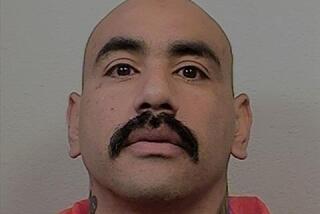In Naples’ mob, there’s no glass ceiling
- Share via
NAPLES, ITALY — In most respects, it was a typical mob shootout: members of feuding clans facing down their rivals on the main street of the small town of Lauro, exchanging gunfire from their cars until three people lay dead and four others wounded.
The difference, though, was that the battle between the Cava and Graziano families involved women only. As townspeople looked on in horror, two mothers in their 50s and a 16-year-old girl were slain in their Audi on the streets of the Naples-area community.
Yet even after the deadly 2002 firefight, prosecutors were slow to act in many cases against the powerful mob women of the Camorra, who have played a major role in Neapolitan crime wars that have lasted a quarter of a century and have claimed the lives of more than 3,000 people, including dozens of innocent bystanders.
Stefania Castaldi, an anti-mafia prosecutor in Naples, cites the case of one Camorrista, the term for a Neapolitan clan member, who was arrested with a stash of drugs and weapons in the master bedroom of his home. A judge threw out her request to indict the suspect’s wife as an accomplice.
“In the past, there was a degree of shortsightedness; investigators did not want to believe that the women were involved,” she said in an interview in Naples with The Times. “There was a general underestimation of the social role of women as well as of the role of the woman within organized crime. . . .
“[But] they did not just have supporting roles, they were protagonists.”
Prosecutions against women are now increasing, said Castaldi, 49, who has spent most of her career trying to loosen the mob’s stranglehold on southern Italian society, first in Sicily and now in Naples
A key reason, she said, is that more female prosecutors are working the cases.
“Only women can understand how much in reality a woman counts,” Castaldi said. “I never have doubts how a woman relates to her man; as a lover, as a wife or as a mother -- I never underestimate them.
“Women prosecutors don’t underestimate the role of the woman as many male prosecutors did in the past. If a Camorra boss told the judge that his wife didn’t know anything about the weapons hidden in their bedroom, a male judge would believe it. But I say, as a woman, it is impossible for her not to know what goes on in her bedroom.”
For decades, women have occupied a full range of roles within the Neapolitan crime syndicate, from bodyguard to boss, authorities say. In Naples, women are traditionally responsible for the finances within the household. They run the accounts and, according to anti-mafia investigators, have taken a major part in money laundering, cutting up drug deliveries for distribution and running numbers.
But wives and mothers have also been among the perpetrators of some of the worst violence in Naples, with the emancipation of women in Neapolitan society over recent decades mirrored inside the secretive world of the Camorra.
According to Naples Police Chief Vittorio Pisani, it is this level of involvement in the illegal affairs of the family that sets the Camorra women apart from those of other Italian criminal organizations such as Cosa Nostra in Sicily and the ‘Ndrangheta in Calabria.
“It is a far more open-minded criminal society than the Sicilian or the Calabrian ones. The reason that there are more women in high positions in the Camorra is because criminal customs follow, step by step, those of civil society.”
As prosecutors focus on the role of women in mob crimes, other agencies are following suit, Castaldi said.
“Today women appear on all of the multiple arrest warrants that we issue,” she said. “It’s more like we are shedding light on a phenomenon that was always there.”
The women operating in the Camorra crime syndicate today have some impressive role models to look back on. The first woman to be charged with “mafia association” was a Neapolitan, Anna Mazza, about a decade ago. The murder of her husband, Gennaro Moccia, gave her the nickname, the “Camorra Widow,” and put the top job within her reach. She grabbed for it. She became the undisputed leader of her clan, moving it toward the lucrative construction industry and dramatically increasing its power.
The diminutive Anna Maria Licciardi was nicknamed “La Piccolina,” the Little One, but clan members and investigators alike knew that she was not to be underestimated. After her father and her older brother were arrested, she decisively fought off competition from another brother to take the top job, and once her husband got out of jail, he had to make do with the role of right-hand man.
Within Camorra circles, her nicknames tended to be more respectful; she was “La Principessa” -- the Princess -- or “La Madrina” -- the Godmother.
Early in her reign, she managed to gain enough respect and authority to bring the factions of the infamous Camorra heartland around the northern Naples district of Secondigliano together after a destructive gang war. She pacified them and reorganized the business to the benefit of all of them, according to prosecutors.
War broke out again toward the end of her reign in 1999, plunging Secondigliano back into violent mob warfare. By the time she was arrested in January 2001, she had made the Interior Ministry’s list of the 30 most wanted. She is now incarcerated under Italy’s harshest prison regime.
The women of the Camorra usually exercise their power behind the scenes. Prosecutors in the battle against organized crime say that if a male Camorrista is going to collaborate effectively and turn state’s evidence, his woman must be completely behind him; otherwise, the majority retract their statements within weeks. Only one woman has so far decided to turn state’s evidence, anti-mafia prosecutor Castaldi said.
As a Neapolitan woman, Castaldi knows the power that women wield in Naples: “We are the connective substance of society -- both in legal and illegal society. A Camorra mother gives milk but also transfers to the child his degree of ‘mafiosity,’ his sense of belonging to the Camorra in terms of values, because these are also values -- negative values, but values.”
Such sentiments are embraced by Naples Mayor Rosa Russo Iervolina. “From woman to woman,” she said in a direct appeal to the women of the Camorra after some of the bloodiest episodes of the most recent Camorra war, “leave the clan. Do it for your children.”
More to Read
Sign up for Essential California
The most important California stories and recommendations in your inbox every morning.
You may occasionally receive promotional content from the Los Angeles Times.










